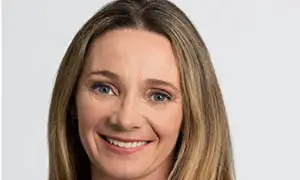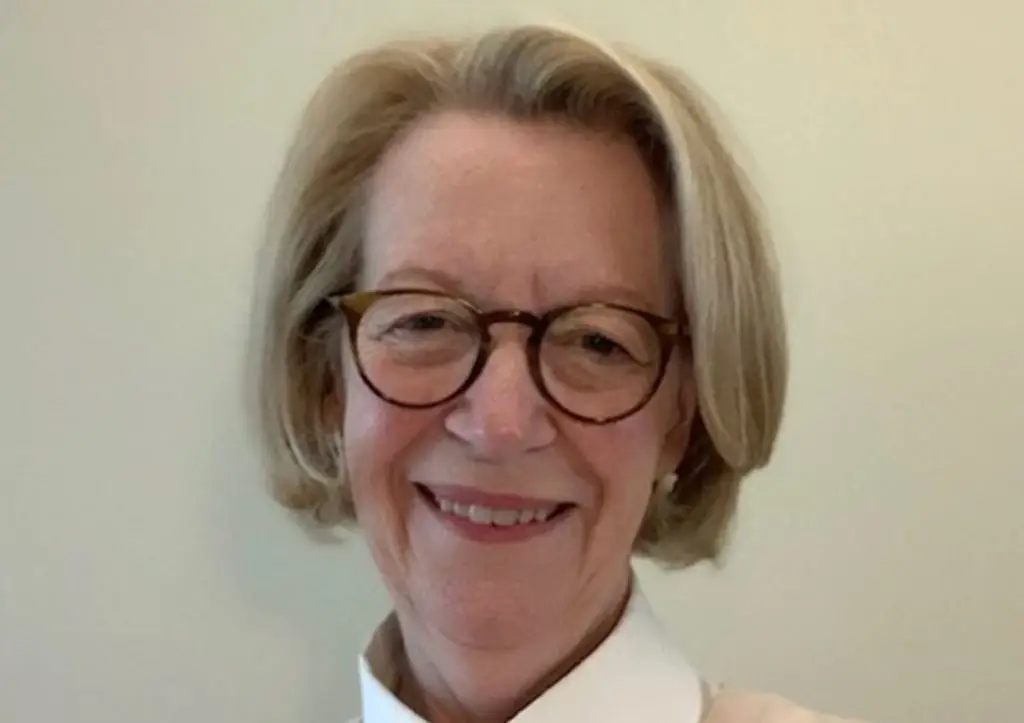In conversation with Wylecia Wiggs Harris: Pivoting AHIMA to renewal and growth
By Lola Opatayo

Wylecia Wiggs Harris, Ph.D., CAE, is the CEO of the American Health Information Management Association (AHIMA). CHIMA had an opportunity to speak with her about leadership, her thoughts on health information conversations in the United States, AHIMA’s policy-based objectives, and the future of the health information profession.
Thank you for speaking to CHIMA today, and congratulations on being listed as one of the top women leaders in health care by Modern Healthcare! Do you have any thoughts to share on this recognition?
I’m definitely honoured to be among Modern Healthcare’s Top 25 women, and I recognize that I stand on the shoulders of the many women who did not have some of the opportunities I’ve had. So, I accept this recognition on behalf of these countless women from the past and current. It takes a village to receive this type of award, and I recognize and celebrate the support of my village—my board, my staff, and those within my family—as I accept this recognition.
In a recent interview, you spoke about reinventing yourself due to the pandemic. Could you tell us a bit about what this looks like for you every day?
Like many, I’ve had time to contemplate and think about life and what’s really important to me. It’s always been important to me to be an empathetic leader, and that has taken on increased importance since the initiation of the pandemic. It is, of course, also important to be an effective leader, and sometimes we see these two things as opposites. I don’t believe they are. I believe that one can be both an empathetic and effective leader, and the pandemic has reaffirmed that for me.
These have been extraordinarily challenging times for us at AHIMA and our colleagues around the world. Different things have been required from us as leaders than in the past, and we’ve had to put more of ourselves out there. We’ve had to show our own vulnerabilities and experienced moments when we were not the best versions of ourselves as we faced death and uncertainty within our own families. And so, when I think about the pandemic, it has caused me to think and lead differently and put a greater focus on hope.
I like to believe I’m a half-glass-full type of person, but I had to dig deep, especially in 2020, because everything looked so bleak. I began to talk about hope. Not only hope to see another day but hope for another opportunity to lead and do things better—a deep abiding hope in the importance of our work at AHIMA. While the work may look different in certain ways than it did pre-pandemic, the pandemic has in no way minimized its importance. We have to be willing to take advantage of emerging opportunities and find the strength and courage to push through the uncertainty and unknowns because we know our work is vital.
Could you share a bit about your leadership journey? What would you say has been the key ingredient to driving operational efficiency in your organization?
This will come as a surprise to many and maybe not a surprise to some: I’m a very strong introvert, and leadership did not always come naturally to me. However, I was fortunate to have strong mentors and supporters who believed in me and pushed me when I needed to be pushed. As a result, I’ve been able to find my voice and passion and recognize that this is the pathway that has been given to me. I enjoy leading now, but I will be honest and say that that wasn’t always the case.
From an operational efficiency perspective, the key ingredient—at least one of the key ingredients—has been my ability to adapt. Life and careers—as we’ve seen during this pandemic—can often be unpredictable. And we have to be able to shift priorities when necessary to make sure we’re meeting the needs of our stakeholders.
Many years ago, I heard a presenter speak at a conference. I don’t recall the presenter’s name, but I recall the topic. He talked about “The importance of the pivot” and our ability to pivot and not be so focused on a given direction that we miss opportunities. I often think about that presentation and hear his voice in my head. He would tell a story and say, “pivot,” and then he would tell another element of that story and say, “pivot.” And that is me. You start out with a plan and think it’s the correct course of action, but then you get new data and realize you’ve got to pivot—you’ve got to shift. So, a key part of my success from an operational efficiency perspective has been my ability to adapt.
Operational efficiency is built on team connection. How do you build solid relationships in your present role as CEO of AHIMA?
I believe in acknowledging the team and not taking credit for others. We have gone 100% remote. That is not how we operated pre-pandemic. So, when we talk about team connection in a remote environment, it looks and feels different—you cannot walk down the hallway to see your colleagues or have lunch together. I really wish I had time to connect with every team member weekly, but that’s just not feasible. What I can do is have those special moments of connection, making sure that we’re creating an environment that allows people to really flourish and grow as individuals and professionals. So, I think team connection starts with culture and a commitment to culture, and I’m doubling down on this at AHIMA and asking, “What aspects of our culture have allowed us to be successful that we want to retain?” and “What aspects are not working and need to shift?”
One of the shifts I’ve made as a leader is to see, articulate, and recognize the humanity of my team members at AHIMA. Yes, they’re an AHIMA staff, and there are expectations of what we need them to accomplish, but they’re also human beings who have walked the difficult journey of the past several years. The same is true of our members. Yes, they have a very specific member role they perform, but they are also human beings. So, it’s this combination of doubling down on our culture and ensuring it’s lending itself to an irresistible workplace and member experience and the ability to see the humanness of people.
Given all that is going on in our environment, we get to the other side of being the best versions of ourselves through relationships. We work hard to build and sustain solid relationships, and that means being as transparent as possible. Sometimes, I can’t tell everybody everything I know in my position. But even being honest about that, saying, “I may have additional data, but I’m not able to share that with you,” is still a form of transparency.
Finally, is making sure people know you value them regardless of their title and role in the organization. You want people to know they’re valued even when you sometimes have to make incredibly difficult decisions.
How have you dealt with the challenges of leadership in a pandemic, and what’s your favourite thing about leading a community of health information professionals?
I hope I’ve been compassionate and empathetic. I hope I’ve been a more effective listener but still held people appropriately accountable. Because we still need to be able to do that. We still have organizations to run and opportunities to take advantage of. Still, I hope I’ve been understanding when people have had their kids and pets on Teams or Zoom or struggled to balance everything.
I had a conversation with another leader about how as much as it’s great to be home and not have to commute, having boundaries at home is sometimes difficult. And if I have that experience, then I know my staff do too. So, being able to really talk about what we’re going through and how to navigate it the best way we can is crucial.
My favourite thing about leading a wonderful community of health information professionals is their passion for their work, and being able to witness that passion and expertise every day is something that brings me joy. They care about their work and understand what it means to advance health care for all. Like other health information professionals, they’ve been impacted tremendously by the pandemic. Some of them were already working remotely, and some of them were not. Some have lost loved ones. Some have experienced Covid themselves. And yet, they still show up as passionate individuals committed to making a difference. It gives me great joy that my team and I support them as they carry out their passion-filled journeys.
When you think about the work you and your team have accomplished at AHIMA since 2018, are there any accomplishments you’re especially proud of? What’s one word you can use to describe it?
Impactful. That’s what I would choose to describe the work we’ve been doing since 2018. We, the board, made a difficult assertion in 2018—and affirmed by some of our members—that we weren’t as healthy as we could be as an organization. In fact, we declared that we were an organization in decline and set a trajectory to become a growth and innovative organization.
There were two organizational pivots we needed to make. The first was that we needed to go from decline to renewal, and the second was that we needed to go from renewal to growth and innovation. And so, I’m really excited because, at the end of 2021, we declared that we had made that first pivot and were no longer an organization in decline. We are solidly an organization focused on renewal and beginning to lay the foundation for how we go from renewal to growth and innovation. It has been tough, but it’s some of the best work I’ve done in my entire career, and I’m glad that I had such a supportive staff and board of directors as we’ve made this pivot.
I’ll also say that I’m incredibly proud of our current financial position because part of making that pivot was to get AHIMA into a better financial position. Trying to do that in the midst of a global pandemic? Wow! But we did it. I mean, we’re no different from any other organization; there were financial impacts. Yet, we were able to make the necessary adjustments for our long-term growth, and as a result of that, we are growing. We’re not stabilizing or downsizing—those were difficult decisions we made those first four years. We’re truly in a growth mindset now.
Can you share a bit of how AHIMA thinks about social determinants of health (SDOH), especially as it affects underrepresented communities? What roles can health information professionals play or continue to play in this regard?
At AHIMA, we support the use of public policy to encourage the collection, access, sharing, and use of social determinants of health. And we do that because we know it has a way to enrich clinical decision-making and improve public health outcomes in culturally respectful ways. This is important work that AHIMA is doing, and it’s personally important to me. We recognize that health information professionals bring a unique and comprehensive view to using SDOH data and are working across the health care landscape to educate, align, and advocate for purposeful and informed strategies that safeguard privacy, reduce costs, improve the quality of care, and foster a patient-centred experience that is broadly accessible and equitable to the communities that health systems serve.
The other side of this is that the appropriate capture, use, exchange, and sharing of SDOH remains a challenge. What do I mean by that? Social risk factors are often undocumented in EHRs, and existing codes that capture SDOH data are not widely used. This includes connectivity and integration between those EHRs and community-based organizations and service providers, which right now remains limited. As policymakers seek to address this critical issue, we believe that AHIMA members have the expertise to offer insights into how we can begin to address some of these challenges.
What policy-based objectives is AHIMA pushing, and how will this affect the profession?
Our 2022 policy agenda has three key elements—which I sometimes call pillars. Our first element is improving the patient’s health journey through access to information, privacy, and equity. So that means we are advocating for policies that improve access for individuals and caregivers to their health data. The second key element is around ensuring the quality and integrity of health information. In particular, we work with the Patient ID Now Coalition to continue advocating for policies that will improve patient matching. The third element is advancing health care transformation. So, as we see evolving consumer expectations and advancements in technology, as well as shifts to value-based care models, we see this ongoing transformation within health care. Therefore, we support public policy that ensures better information flows, payment and delivery models (like Telehealth), and remote patient monitoring.
So, that’s our advocacy agenda for 2022. It’s a lot, but we believe this is a really important advocacy agenda for AHIMA and our members to be focused on.
As we continue to grapple with the pandemic and its effect on the conversations around health data, do you see these conversations taking a new turn? What health data issues do you imagine will begin to show up in health conversations in the United States (US)?
One of the areas where we are going to see continued conversations in the US is around health equity, and I would say that’s not just a US conversation. I think it’s a worldwide conversation. The pandemic has really highlighted health disparities in our country, and we continue to grapple with some of the data points that have surfaced as a result of the pandemic. Not that these are only pandemic-related, but the spotlight was shone on those health equities, so that’s a conversation we’ll continue to have.
I think the second part of your question relates to us as consumers becoming more educated about our own data and having access to it. As we see improvements in technology, we’re going to have even more conversations around consumer access and how consumers manage (or even allow others to manage) their own data. Consumers will be able to do more with their data, so I see that as an ongoing conversation. Like health equity, it’s not a new conversation about consumers having access to their health information but a continuation of a conversation and, perhaps, even an elevation of the conversation as technology advances.
Covid has taught us the importance of looking toward and preparing for the future. What goals would you say health information professionals can begin to aspire towards? What spaces can we hope to thrive in, and what structures do you think need to be in place for this to happen?
I agree that Covid is pushing us toward becoming more future-focused, but I think there are still things from our past and our current that are still important. Specifically, as health care continues to evolve, the accuracy, integrity, protection, and accessibility of health information remain a priority for AHIMA and health information professionals. So, just as we talked about Covid shining the spotlight on health disparities, I think it’s also shone a spotlight on the importance of complete and accurate data, making sure we have appropriate safeguards in place for that data.
As we begin to think about what’s next and look forward to a pre-Covid world, I think those elements are still going to be priorities for us with our work. We’re also going to continue to work to ensure that patients receive high-quality care and that we have an opportunity to identify our role in the development of new technologies and treatments.
We also have to ensure that we’re empowering leaders at all levels to make effective, strategic decisions, and one way you empower leaders to do so is to make sure they have the appropriate data to inform their decision-making. I believe that health information professionals have a bright, evolving future, and at some point, it may look differently than it does today. It will still be a very important profession, but just as AHIMA will continue to advocate for the profession externally, we also need health professionals to continue to advocate within their jobs. We need our professionals that are boots on the ground to elevate the profession using a bottom-up approach. That’s how we keep the profession relevant and highlight our priorities to a vast array of audiences—consumers, regulatory bodies, and health policymakers. With this approach, we get the pleasure of helping our members figure out how best to advocate within their spaces.
Wylecia’s interview responses have been edited for the purposes of this article.






